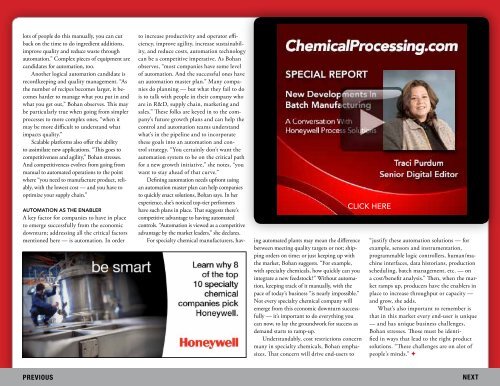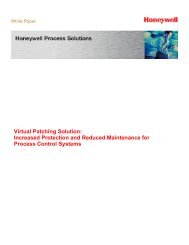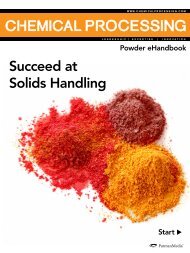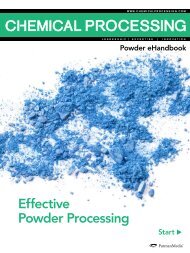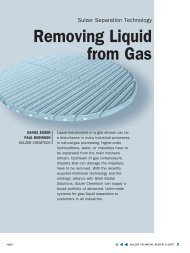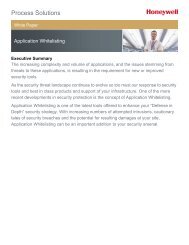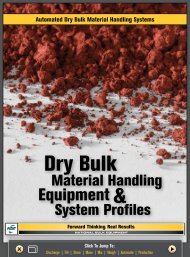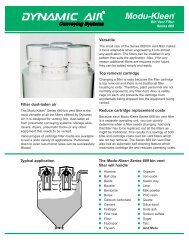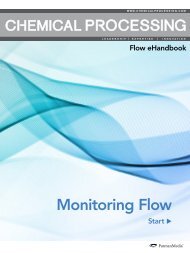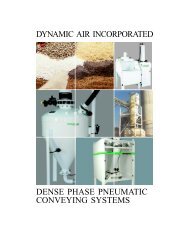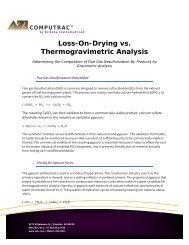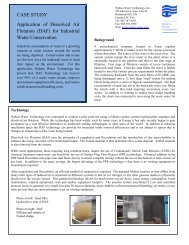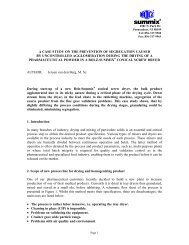Prepare for the Economic Recovery - Chemical Processing
Prepare for the Economic Recovery - Chemical Processing
Prepare for the Economic Recovery - Chemical Processing
You also want an ePaper? Increase the reach of your titles
YUMPU automatically turns print PDFs into web optimized ePapers that Google loves.
lots of people do this manually, you can cut<br />
back on <strong>the</strong> time to do ingredient additions,<br />
improve quality and reduce waste through<br />
automation.” Complex pieces of equipment are<br />
candidates <strong>for</strong> automation, too.<br />
Ano<strong>the</strong>r logical automation candidate is<br />
recordkeeping and quality management. “As<br />
<strong>the</strong> number of recipes becomes larger, it becomes<br />
harder to manage what you put in and<br />
what you get out,” Bohan observes. This may<br />
be particularly true when going from simpler<br />
processes to more complex ones, “when it<br />
may be more difficult to understand what<br />
impacts quality.”<br />
Scalable plat<strong>for</strong>ms also offer <strong>the</strong> ability<br />
to assimilate new applications. “This goes to<br />
competitiveness and agility,” Bohan stresses.<br />
And competitiveness evolves from going from<br />
manual to automated operations to <strong>the</strong> point<br />
where “you need to manufacture product, reliably,<br />
with <strong>the</strong> lowest cost — and you have to<br />
optimize your supply chain.”<br />
Automation as <strong>the</strong> enabler<br />
A key factor <strong>for</strong> companies to have in place<br />
to emerge successfully from <strong>the</strong> economic<br />
downturn; addressing all <strong>the</strong> critical factors<br />
mentioned here — is automation. In order<br />
to increase productivity and operator efficiency,<br />
improve agility, increase sustainability,<br />
and reduce costs, automation technology<br />
can be a competitive imperative. As Bohan<br />
observes, “most companies have some level<br />
of automation. And <strong>the</strong> successful ones have<br />
an automation master plan.” Many companies<br />
do planning — but what <strong>the</strong>y fail to do<br />
is to talk with people in <strong>the</strong>ir company who<br />
are in R&D, supply chain, marketing and<br />
sales.” These folks are keyed in to <strong>the</strong> company’s<br />
future growth plans and can help <strong>the</strong><br />
control and automation teams understand<br />
what’s in <strong>the</strong> pipeline and to incorporate<br />
<strong>the</strong>se goals into an automation and control<br />
strategy. “You certainly don’t want <strong>the</strong><br />
automation system to be on <strong>the</strong> critical path<br />
<strong>for</strong> a new growth initiative,” she notes, “you<br />
want to stay ahead of that curve.”<br />
Defining automation needs upfront using<br />
an automation master plan can help companies<br />
to quickly enact solutions, Bohan says. In her<br />
experience, she’s noticed top-tier per<strong>for</strong>mers<br />
have such plans in place. That suggests <strong>the</strong>re’s<br />
competitive advantage to having automated<br />
controls. “Automation is viewed as a competitive<br />
advantage by <strong>the</strong> market leaders,” she declares.<br />
For specialty chemical manufacturers, hav-<br />
ing automated plants may mean <strong>the</strong> difference<br />
between meeting quality targets or not; shipping<br />
orders on time; or just keeping up with<br />
<strong>the</strong> market, Bohan suggests. “For example,<br />
with specialty chemicals, how quickly can you<br />
integrate a new feedstock?” Without automation,<br />
keeping track of it manually, with <strong>the</strong><br />
pace of today’s business “is nearly impossible.”<br />
Not every specialty chemical company will<br />
emerge from this economic downturn successfully<br />
— it’s important to do everything you<br />
can now, to lay <strong>the</strong> groundwork <strong>for</strong> success as<br />
demand starts to ramp-up.<br />
Understandably, cost restrictions concern<br />
many in specialty chemicals, Bohan emphasizes.<br />
That concern will drive end-users to<br />
CLICK HERE<br />
“justify <strong>the</strong>se automation solutions — <strong>for</strong><br />
example, sensors and instrumentation,<br />
programmable logic controllers, human/machine<br />
interfaces, data historians, production<br />
scheduling, batch management, etc. — on<br />
a cost/benefit analysis.” Then, when <strong>the</strong> market<br />
ramps up, producers have <strong>the</strong> enablers in<br />
place to increase throughput or capacity —<br />
and grow, she adds.<br />
What’s also important to remember is<br />
that in this market every end-user is unique<br />
— and has unique business challenges,<br />
Bohan stresses. Those must be identified<br />
in ways that lead to <strong>the</strong> right product<br />
solutions. “These challenges are on alot of<br />
people’s minds.” F<br />
PreviouS<br />
Next


